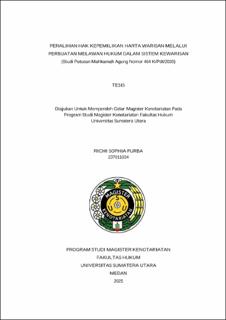PPeralihan Hak Kepemilikan Harta Warisan Melalui Perbuatan Melawan Hukum Dalam Sistem Kewarisan (Studi Putusan Mahkamah Agung Nomor 464 K/Pdt/2020)
Transfer Of Inheritance Ownership Rights Through Unlawful Acts in the Inheritance System: A Case Study Of Supreme Court Decision No.464 K/Pdt/2020

Date
2025Author
Purba, Richi Sophia
Advisor(s)
Purba, Hasim
Sembiring, Rosnidar
Metadata
Show full item recordAbstract
The unlawful transfer of inheritance rights remains a common issue in societal practices in Indonesia. Although the inheritance legal system clearly regulates the mechanisms for transferring inherited property, in reality, many parties attempt to gain control over inheritance assets through illegal means. This study addresses three main questions: (I) What is the legal status of adopted children compared to a childless wife under Balinese customary law? (2) What forms of inheritance transfer indicate unlawful acts within the Balinese customary inheritance system? (3) How is the Supreme Court's legal reasoning in Decision No. 464 K/Pd/2020 analyzed from the perspective of Balinese customary law.
This research adopts a normative juridical method, relying on legal norms through literature studies relevant to the issues examined. The research is descriptive in nature and employs qualitative data analysis.
The study foads that within the patrilineal Balinese customary law system, adopted children who have undergone the "pemerasan" ceremony hold significantly stronger inheritance rights than a childless wife. Adopted children are recognized as successors to the family lineage and entitled to full inheritance rights, while a childless wife is only entitled to jointly acquired property (gono-gini) and excluded from access to ancestral assets. Forms of unlawful inheritance transfers in Balinese customary law include unilateral transfers without heir
consent, manipulation of "putung" status, document forgery, and misuse of property management roles for personal gain-violating principles of transparency and deliberation embedded in Balinese customs. The analysis of Supreme Court Decision No. 464 K/Pdt/2020 reveals that although the judges recognized the adopted child's legal status as an heir based on available evidence, the ruling fell short in addressing broader justice considerations. It did not assess the moral responsibility of adopted children in caring for their adoptive parents.Thus, a more holistic approach is required to balance legal certainty with substantive justice values.
Collections
- Master Theses (Notary) [2330]
